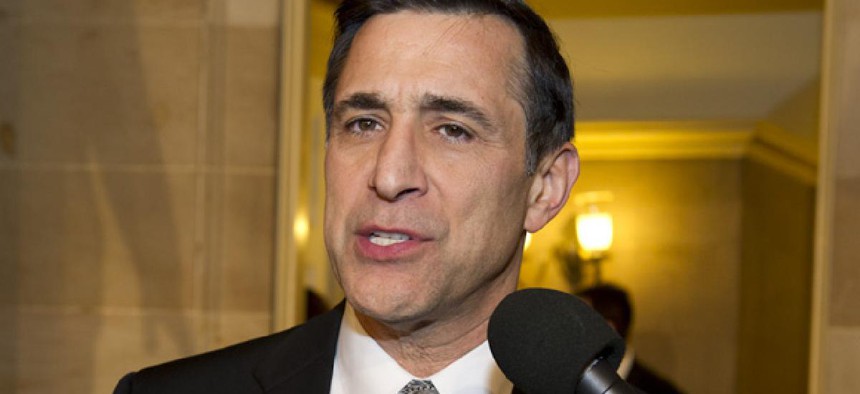
Rep. Darrell Issa, R-Calif. National Journal file photo
House approves transparency bill, citing GSA scandal
DATA Act would require online disclosure of spending and curb conferences.
The House on Wednesday by voice vote approved the Digital Accountability and Transparency Act to increase transparency on federal agency spending, with speakers on the floor repeatedly invoking the recent spending scandal at the General Services Administration.
The legislation known as the DATA Act (H.R. 2146) would impose a universal reporting requirement for recipients of federal grants, loans and contracts, while requiring all agencies to use the same formats to publicly share their internal and external obligations and expenditures. In addition, a late amendment would curb agency spending on conferences.
Support for the House legislation was bipartisan, with Republicans and Democrats both blasting the recently revealed $820,000 Las Vegas conference held by GSA’s Western Regions in October 2010. Support in the Senate appears more limited.
The agency’s conference funding was “cobbled together from different baskets of money, so GSA officials could have family vacations,” said the act’s chief sponsor, Rep. Darrell Issa, R-Calif., chairman of the House Oversight and Government Reform Committee. Neither the staff of his committee nor the inspectors general alone can protect the American taxpayer against wasteful spending, he added, which is why the bill’s approach of “recipient reporting” is needed.
Issa thanked various open-government groups for their help in shaping the bill, as well as Vice President Joe Biden and retired Recovery Board Chairman Earl Devaney, whose Recovery.gov website served as a model for the Accountability Act’s approach to tracking spending.
The committee’s ranking minority member, Rep. Elijah Cummings, D-Md., also commended the bipartisan effort, noting some of the bill’s provisions echo President Obama’s executive orders to curb waste and reduce agency spending on travel. Cummings also praised colleagues for accepting changes in the bill, which originally was introduced in June 2011.
One of the two dozen transparency advocacy groups that backed the bill, the nonprofit OMBWatch, said in an analysis that it switched its stance from opposition to support for the bill once provisions were removed that would have repealed an earlier transparency law, the 2006 Federal Funding Accountability and Transparency Act, and another that would have required a more restrictive “sunset” of DATA.
After the legislation was approved under suspension of the rules, OMBWatch President Katherine McFate said the vote “represents a bipartisan congressional commitment to new levels of government openness. In the coming years, our nation will be facing tough choices about how we spend precious public dollars. The DATA Act is a critical first step toward ensuring that every citizen has the information he or she needs to understand the choices our public officials make while investing public resources.”
One of the act’s key champions, Rep. Dennis Ross, R-Fla., warned on the House floor that the bill “sends a clear message to bureaucrats in Washington that the American public is watching and demands accountability.” Ross on Tuesday introduced a bill (H.R. 4472) to reduce the travel budgets of every federal agency by half next fiscal year, and more in subsequent years, while requiring more detailed reports of their travel spending to congressional committees.
NEXT STORY: How technology is changing health care







